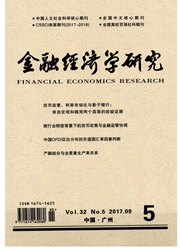

 中文摘要:
中文摘要:
基于信息与交易者情绪对期货价格波动的影响机理,将成交量和持仓量作为交易者情绪的代理变量引入EGARCH,构建了一个量价关系模型,对中国七种主要农产品期货量价关系的实证结果显示:农产品期货价格波动与预期成交量正相关,与预期持仓量负相关;前期价格变化、未预期成交量和未预期持仓量的冲击对农产品期货价格波动的影响不对称,绝大多数农产品期货价格波动对前期价格下跌、当期成交量放大和当期持仓量减少更敏感。这表明交易者信念差异增大、信心增强引发的交易量放大,以及风险偏好降低引发的减仓行为都会加大农产品期货价格波动;提高交易费用以抑制交易量有助于平抑农产品期货价格波动,提高保证金比率以抑制持仓量短期反而会增大农产品期货价格波动,建议将调节交易费用作为调控农产品期货价格波动的主要政策手段。
 英文摘要:
英文摘要:
Based on the mechanism that information and trader sentiment had impact on the futures price volatility,this paper brought in EGARCH and constructed a price-volume relationship model with volume and open interest as proxy variables of trader sentiment. Empirical tests of seven agricultural commodity futures markets in China showed that expected volume was positively related to the volatility and expected open interest was negatively related to the volatility; the impact of unexpected price,unexpected volume and unexpected open interest shocks on the volatility was asymmetric; the volatility was more sensitive to bad news,positive unexpected volume shocks and negative unexpected open interest shocks. This implied that the trading volume increase caused by the traders' heterogeneous beliefs and over confidence enlarging,and open interest decrease caused by traders' risk aversion declining,may exacerbate agricultural commodity futures price volatility. Increasing transaction costs to suppress trading volume was helpful to stabilize agricultural commodity futures price volatility; increasing margin ratio to suppress open interest may exacerbate the volatility in short-term. Transaction costs should be used as the main policy tool to control agricultural commodity futures price volatility in China.
 同期刊论文项目
同期刊论文项目
 同项目期刊论文
同项目期刊论文
 期刊信息
期刊信息
